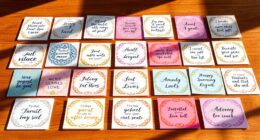Mastering self-description is essential for your career success. To start, reflect on your unique strengths, like creativity and leadership, and think about how they've positively impacted others. Make sure to align your self-description with job listings by using specific language employers value, such as "adaptable" or "team player." Highlight your experiences with concrete examples to demonstrate your capabilities. Maintain a confident and authentic tone to resonate with potential employers. Practicing your delivery will make you sound more natural in interviews. Explore how to craft a compelling narrative that showcases your professional journey effectively and inspires confidence.
Key Takeaways
- Identify and reflect on your unique strengths to effectively showcase your value to potential employers.
- Tailor your self-description to align with job descriptions using specific language and keywords noted in listings.
- Use concrete examples to demonstrate your capabilities and the positive impact of your contributions in previous roles.
- Maintain a confident and authentic tone in your self-description to resonate positively with interviewers and networking contacts.
- Practice your delivery to ensure a natural and engaging presentation during interviews and professional interactions.
Reflecting on Personal Strengths

When you're preparing to describe yourself, it's important to reflect on your personal strengths. Think about the traits that set you apart—your creativity, adaptability, or leadership skills.
Consider how these strengths have positively impacted your peers or clients. For example, maybe your innovative ideas led to a 10% sales increase in your last project.
Identify the abilities that enabled these successful outcomes and make a note of them. You can use tools like self-assessment quizzes or feedback from colleagues to help pinpoint your strengths. Additionally, considering natural remedies can enhance your overall well-being, which may further improve your performance in professional settings.
Aligning With Job Descriptions

Aligning your self-description with the job description can greatly enhance your chances of landing the role you desire. Start by carefully reviewing the job listing, paying attention to the key requirements and desired traits.
Notice the specific words and phrases used, like "team player" or "innovative thinker." These are clues to the qualities the employer values. When you describe yourself, mirror that language to create a connection.
For instance, if the job emphasizes adaptability, highlight your experiences where you've successfully navigated change. By doing this, you help the hiring manager envision you in the role.
Tailoring your self-description not only shows you understand the position but also demonstrates your genuine interest in becoming part of their team.
Effective Self-Description Techniques

Crafting a compelling self-description involves using effective techniques that resonate with potential employers. Start by reflecting on your strengths—highlight traits that showcase your positive impact on peers or clients. Use specific examples, like how your innovative ideas led to a significant sales increase, to illustrate your capabilities.
Next, align your self-description with the job description. Incorporate keywords and phrases from the listing to demonstrate that you fit the role. Keep your tone confident and authentic; potential employers appreciate sincerity.
Finally, practice delivering your self-description smoothly. This helps you sound natural during interviews and networking opportunities. By employing these techniques, you'll create a memorable self-description that stands out to hiring managers.
Exploring Related Resources

Resources play an essential role in enhancing your self-description skills and overall career development. By exploring various articles and tools, you can refine your ability to present yourself effectively. Here's a quick reference table to guide your journey:
| Resource Type | Purpose | Example |
|---|---|---|
| Articles | Tips on writing about yourself | "How to Craft Your Self-Description" |
| Interview Guides | Prepare for personal descriptor questions | "Top 10 Interview Questions" |
| Resume Tools | Enhance impact with effective adjectives | "Powerful Resume Adjectives" |
Utilizing these resources can help you articulate your strengths and align your self-description with career goals, ultimately boosting your confidence in job applications and interviews. Additionally, establishing healthy boundaries can enhance your interactions during networking opportunities, ensuring you present your best self.
Essential Career Skills and Insights

Mastering essential career skills can set you apart in a competitive job market.
To enhance your appeal to employers, focus on developing these four key skills:
- Communication: Clearly convey ideas and collaborate effectively with colleagues.
- Problem-Solving: Approach challenges creatively and find innovative solutions.
- Adaptability: Adjust to changing environments and embrace new technologies.
- Teamwork: Work well with others, fostering a collaborative atmosphere.
Additionally, cultivating a growth mindset can significantly improve your ability to navigate challenges in your career.
Frequently Asked Questions
How Can I Improve My Self-Description Over Time?
To improve your self-description over time, regularly reflect on your strengths and achievements.
Keep track of positive feedback from peers or clients that highlights your impact.
Update your skills and experiences as you grow, aligning them with your current goals.
Review job descriptions to understand what traits are valued in your field, and adjust your language accordingly.
Practicing self-description in different contexts, like networking or interviews, will also enhance your confidence.
What Common Mistakes Should I Avoid in Self-Description?
When it comes to self-description, you don't want to put all your eggs in one basket. Avoid vague terms that don't highlight your strengths; instead, be specific about your achievements.
Don't exaggerate or downplay your skills either, as honesty is key. Also, steer clear of negativity or self-deprecation; focus on the positive impact you've made.
Finally, using jargon can confuse, so keep your language clear and relatable.
How Do I Tailor My Self-Description for Different Industries?
To tailor your self-description for different industries, start by researching each field's specific language and values.
Identify key traits employers seek and reflect those in your description. Use relevant examples from your experience that demonstrate how your skills align with industry demands.
Remember to adjust your tone based on the industry culture—more formal for corporate settings, and more casual for creative roles.
This approach helps you connect with hiring managers effectively.
Can I Use Humor in Professional Self-Descriptions?
Sure, you can use humor in professional self-descriptions, but it's crucial to know your audience.
When appropriate, humor can showcase your personality and make you memorable. Just make sure it aligns with the company culture and job role.
You wouldn't want to come off as unprofessional in a serious setting. Balance is key; a light-hearted touch can work wonders, but always prioritize clarity and professionalism in your overall message.
What Role Does Confidence Play in Self-Description?
Imagine you're a ship sailing through a sea of opportunities. Confidence acts as your sturdy anchor, keeping you steady amidst the waves.
When you describe yourself, that confidence shines through, making your traits and achievements resonate. It helps you communicate clearly, compelling others to see your value.
Without it, your message may drift aimlessly. So, embrace your strengths, and let your self-description reflect the confident captain steering your career journey.
Conclusion
As you commence your journey to master self-description, remember it's all about showcasing the best version of you. By highlighting your strengths and aligning with job descriptions, you'll paint a vivid picture of your potential to employers. Embrace this opportunity to share your unique story—think of it as opening a door to thrilling new adventures in your career. With these techniques in your toolkit, you're well on your way to enchanting the attention you deserve!
Eugene brings a fresh, dynamic voice to our platform as one of our talented Writers. Specializing in research-driven content, he explores the latest findings in psychology and personal growth, translating them into actionable insights for our readers. Eugene’s work is fueled by a curiosity about what makes us tick and a desire to help others unlock their potential.










